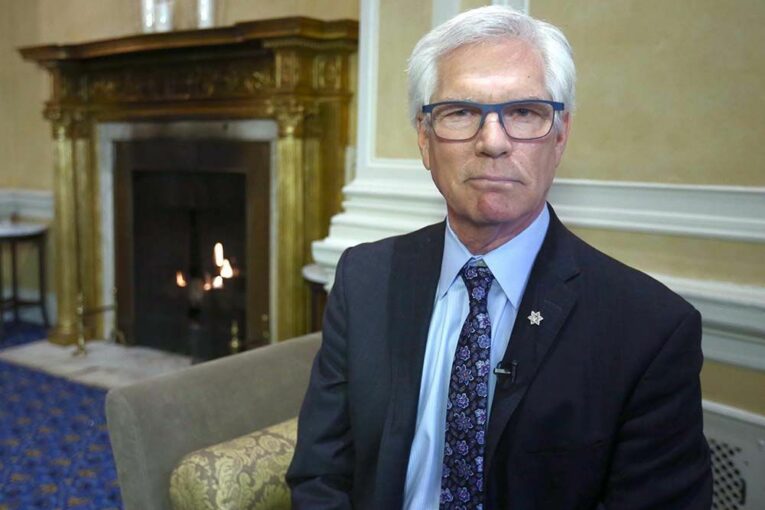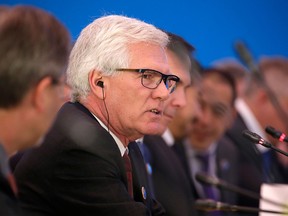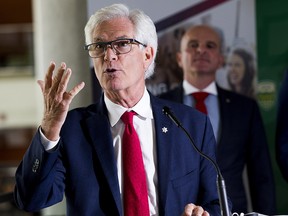
It’s not easy being a federal natural resources minister during times of trouble in the oilpatch, and it’s doubly so for a Liberal minister arriving in Calgary to defend unpopular policies during a highly charged energy debate.
Think about the fierce battles over Bill C-69, Energy East and Northern Gateway.
But Winnipeg South Centre MP Jim Carr, who was the minister of natural resources during the tense showdown over the fate of the Trans Mountain pipeline expansion — and later became the prime minister’s special representative for the Prairies — managed to do so with a calm, cool demeanour, even when facing a tough crowd.
“I know that my party and my government is not popular here. I mean, you don’t have to be a genius to figure that out,” Carr told a Calgary Chamber of Commerce luncheon just a few weeks before the pandemic struck in early 2020.
“The reason that we have this disconnect is that we’re not listening to each other, and me and the government of Canada have to do a much better job.”
On Monday, Carr died in his home at the age of 71 after battling kidney failure and multiple myeloma.

“He was a charming man, down to earth, and he listened,” said Ian Anderson, the former CEO of Kinder Morgan Canada who later became the head of Trans Mountain Corp. after the pipeline was bought by the Trudeau government.
Carr, who worked as a columnist with the Winnipeg Free Press and was the founding CEO of the Business Council of Manitoba, was elected to the federal riding in 2015 and soon became the country’s natural resources minister.
He stayed in that role until July 2018, when he took over as minister of international trade diversification, before becoming the prime minister’s special representative for the Prairies. That position was created after the Liberals failed to win any seats in Alberta or Saskatchewan in the October 2019 election.
Carr wasn’t a flashy, headline-grabbing politician looking to drop the gloves for a partisan scrap. He seemed more driven by a desire to find common ground — no mean feat, given the conflict between federal and provincial governments over the energy landscape.
“Jim was unflappable,” said Janet Annesley, who served as Carr’s chief of staff for almost two years after working with the Canadian Association of Petroleum Producers (CAPP).
“Whenever we came to Calgary, he looked to engage with the biggest critics we could find . . . He knew that trying to satisfy some of the biggest critics in the oil and gas industry might not be possible, but he certainly wanted to try.”
It was often an uphill trek to find common ground as the federal government squared off with the province over issues such as Ottawa’s blocking of the Northern Gateway project, emissions policy, Canada’s pipeline paralysis and the energy transition.
Recommended from Editorial
-

Boomtown, B.C.: The planned growth of the liquefied natural gas industry is turning Kitimat into the next energy centre
-

‘I want to make you happy,’ Trudeau’s Prairie envoy Jim Carr tells Calgary crowd
-

Trans Mountain expansion is running over budget by billions of dollars and months behind schedule
-

Encana, whose history in Canada dates back to 1800s, says farewell to the TSX today as it heads south
Carr’s trip to Calgary in January 2020 came the same day that Encana Corp. officially voted to pack up and shift its corporate headquarters from Calgary to Denver.
At the time, the city was reeling from several years of layoffs in the oil and gas sector. Many in the industry pointed the finger squarely at Ottawa for obstructing new energy infrastructure through its Impact Assessment Act, known as Bill C-69.
Chris Bloomer, former head of the Canadian Energy Pipeline Association and a vocal opponent of Bill C-69, said Carr was handed the difficult chore of advancing policies from the prime minister’s office that frustrated the oil and gas sector.

Yet, Carr remained widely respected for his upfront approach, Bloomer said Tuesday.
“He was handed a file that was kind of on fire,” Bloomer added.
“He was a man of conviction and was always forthright. As a person, he was hard not to like.”
Business Council of Alberta president Adam Legge first met Carr shortly after the Winnipeg MP took over the natural resources portfolio. They later conferred when Legge was setting up the business council in 2019 in Alberta, drawing on Carr’s experience in Manitoba.
“What I always admired with Jim was he never minced words,” said Legge.
“If he couldn’t do something, or policy wasn’t going to go your way or (on) legislation, he would speak about it very directly — he never hid behind talking points.”
One of the trickiest tasks in the resources portfolio came in 2018, as the quagmire surrounding the Trans Mountain pipeline expansion deepened.
Carr was one of the key ministers engaged in the issue as private owner Kinder Morgan Canada was preparing to walk away from the development in the face of opposition from then-B.C. premier John Horgan.
Tensions increased between Alberta, B.C. and the feds that spring. By May, Ottawa agreed to buy the beleaguered project for $4.5 billion.
It wasn’t the first option — and it was costly, as construction costs have risen to $21.4 billion since then — but the project is being built.
Anderson, who as president of Kinder Morgan Canada dealt frequently with Carr when the project was in jeopardy, recalls the minister was well-prepared and confident in making decisions, once he’d examined the options.
“He helped me come up with solutions that would be acceptable to the cabinet and the prime minister’s office,” said Anderson.
“Once he was in agreement that this was a national interest project that had to get built, he invested in the time and energy to work amongst his colleagues to come to the right conclusion. So he was instrumental.”
There were other clashes that unfolded over the West Coast tanker ban and the ill-fated Energy East pipeline.
However, Enbridge’s Line 3 replacement project was built, the LNG Canada megaproject was approved and is now being constructed, and the Trans Mountain expansion is underway, noted Annesley.
“It took his leadership to find solutions on many of these issues,” said Annesley, who is now chief sustainability officer at Kiwetinohk Energy Corp.
“Jim’s fingerprints are on all those files.”
Chris Varcoe is a Calgary Herald columnist.
You can read more of the news on source
